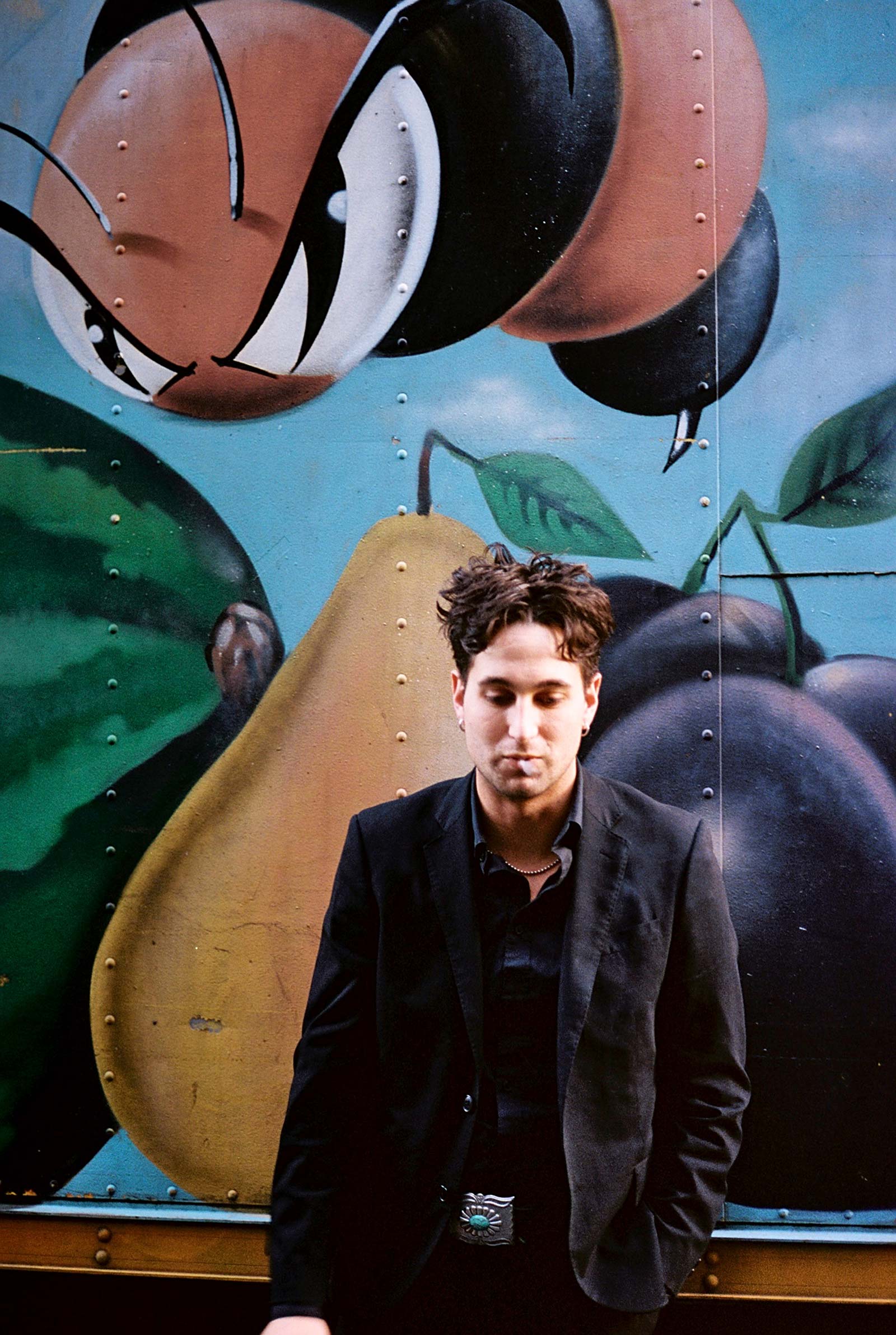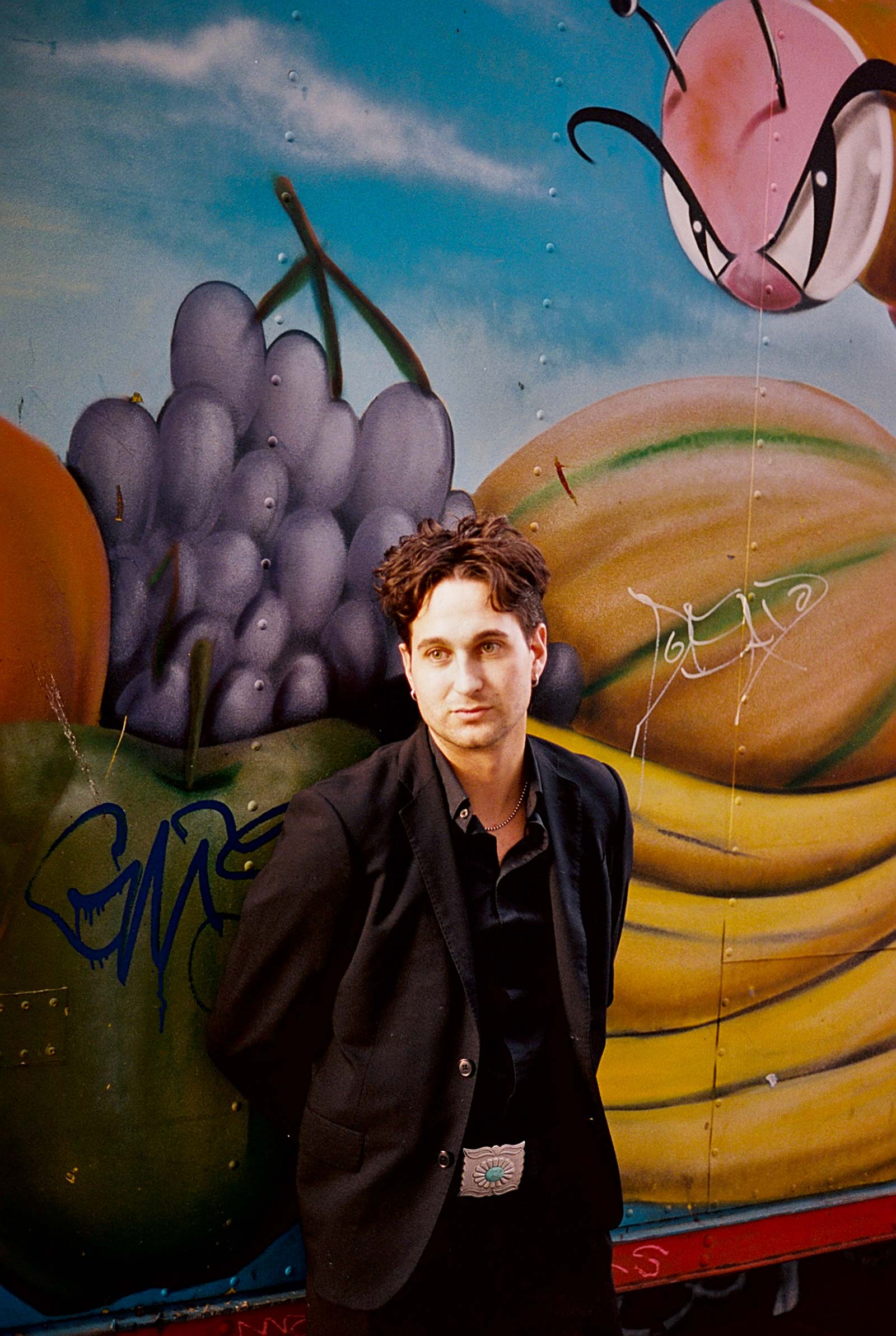The artist joins Document to muse on the standards he believes art should be held to, and elaborate on the ways he’s actively prevented himself from fulfilling them
Jordan Raoufpur is a hyphenate—with emphasis on the lack of multi. “I think it’s important to keep it to one hyphen,” he says on limiting his mediums to music and acting, an effort to avoid corrupting the artistic process by leaving sufficient time and energy to focus on each of his crafts. It quickly becomes clear that this lack is only a nominal one: Yes, Raoufpur does music (most recently releasing an EP, The Last Deer in Laurel Canyon, under the moniker Jordan Raf) and he’s an active actor (via a “teeny-tiny cameo” in Kristoffer Borgli’s upcoming Dream Scenario; a forthcoming short, Friyay, co-starring alongside Jury Duty’s Edy Modica; and another short, Middle Sized Things, which came out last week). But he also does poetry (fairly officially, writing for Des Pair Books’s literary journal and in Spectra Poets newsletter); is an academically-trained screenwriter (as a drop-out of a graduate program at Columbia); and works as a practicing ceramicist (out of Togei Kyoshitsu studio); among, probably, many other things. In Raoufpur’s mind, it is all connected, but it should be separate; these pastimes are completely unalike, but they’re also the same.
Everything about the artist is essentially underscored by that state of conflict. He intends to prank me—arriving on Zoom equipped with a fart machine and a fake meditation exercise—but he can’t follow through, overcome by his conscience, sacrificing humor for humanity. He’s a self-proclaimed “big fucking hypocrite,” very conscious of the way he sometimes embodies the exact things he finds most appalling in the world around him. He feels misunderstood—and he feels like that’s his own fault. Modern times, to Raoufpur, are akin to the ’80s, defined by their saturation and performative overtones; it’s something he’s equally disgusted and propelled by, averse to and engrossed in. He’s torn between breaking through the noise, in embodying his own extremities, and cutting through the facade with a willful earnestness. (For now, he’s leaning toward the latter.)
Following the release of The Last Deer in Laurel Canyon, Raoufpur joins Document to muse on the standards he believes art should be held to, and elaborate on the ways he’s actively prevented himself from fulfilling them.
Megan Hullander: The bio you sent me was really dramatic. Are you a theatrical person?
Jordan Raoufpur: Everyone has a really short attention span, and, in this phase of modernity, everything is super sensationalized. Especially with art, and in America, and—I hate to say the c-word—with capitalism, everything has to be the most extreme version of itself for it to even faze the average listener, the average reader, whatever.
When I first got started in the music industry, I signed with Atlantic Records. I remember finally seeing behind the curtain: It was just communications majors on a ton of Adderall being like, People need to know you do drugs. You have mental illness? You gotta let people know. In the past, I’ve sort of pandered to the most extreme version of myself. But [this EP] is symbolically really important to me, because it’s signifying a transition in my artistic practice, of going from this character of a satirical, overplayed version of what an artist is right now, to being a little bit more sincere.
Megan: How do you toe the line between self-indulgent oversharing and offering that sincerity in your work?
Jordan: That’s the thing: I’m such a big fucking hypocrite. I sound like an asshole, [because] I’ve become really grossed out by people oversharing, but the thing I’m proud of is the video for ‘Scales of St. Michael.’ There’s a 4k camera inside of my mouth, and that was an overshare. But I see a lot of these people whose brand is like, My crush put out a cigarette on me—and I don’t think you have to capitalize on every moment in your life. I think the best way to push back on that is to make more private moments for yourself. I’m still figuring it out. I’m not on a label now; I don’t have a publicist. So maybe I’m [holding back on] oversharing at the worst time, but it feels like there’s not a lot of artistic integrity anymore.
Megan: What do you think artistic integrity looks like, then?
Jordan: Just acknowledging that you have to use those platforms, but not making it your whole thing. A lot of musicians now are just brands. Maybe I’m an idiot with a one-track mind, but I feel like you’re not focusing on your craft if you’re thinking about [your persona] all the time. For me, personally, it’s really fucking hard to separate the artists from the art—it’s like you’re going through their brains.
“It’s signifying a transition in my artistic practice, of going from this character of a satirical, overplayed version of what an artist is right now, to being a little bit more sincere.”
Megan: How do you differentiate yourself from the slew of multihyphenates? Do you think about your work in music and acting differently from each other?
Jordan: Brooklyn Beckham is my favorite version of that shit—chef, photographer, whatever. I’m scared of even coming off like a drip like that. But I’ve kept it to two: music and acting. I mean, I write and do poetry—but those are parts of music and acting. And I think you should keep them separate. You’ve got to be careful [with] character-creation-persona shit, because you can cancel out one version of yourself. It’s hard, because—as much as I’m talking shit about everything—there are such fucking amazing people in every art form. There are insanely talented musicians, there are insanely talented actors, there are insanely talented filmmakers, and insanely talented writers. If you’re a multihyphenate, you’re spread a little thin. It’s hard to be talented at one thing.
Megan: The multihyphenate is a very hyper-modern thing. And it feels connected to the critique of modernity that is sort of the overarching theme of your EP. How do you detach yourself from it enough to critique it, when you still do need the internet, et cetera, to communicate that critique?
Jordan: We’re on Zoom talking, right? I reached out to you through Instagram. I have no fucking idea. I don’t think I do. Everyone thinks we’re living in an age where everything is mid. So many people are comfortable. And they’re churning out shit, because they can, you know?























